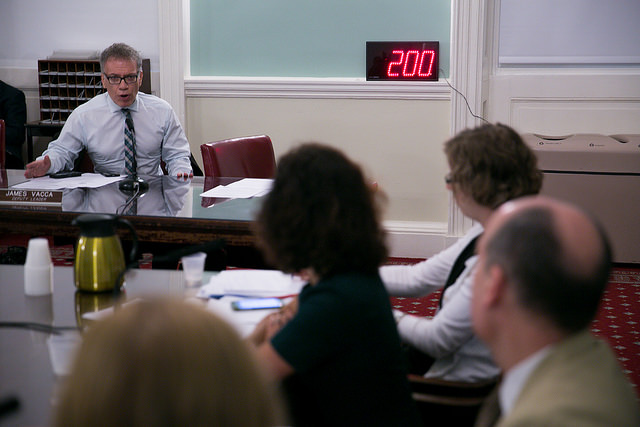
Council Member Vacca at a council hearing (photo: William Alatriste)
NEW YORK—There have been few pieces of city council legislation that the de Blasio administration has testified directly against, but on Wednesday, that mold was broken.
The Council's technology committee held on Wednesday the first hearing on Intro. 471, which would create an online platform where New Yorkers can start and sign petitions aimed at receiving a government response. Similar to the We the People site created by the White House, once a certain number of signatures is reached on the city platform, a city agency or public authority would be required to issue a response.
Council Member James Vacca, who introduced the legislation and chairs the technology committee, said the platform would give New Yorkers a place to discuss and introduce policy ideas to their government, something the city's 311 service isn't really designed to do.
The idea behind the bill is to give city government a new pathway to digital civic engagement, something the de Blasio administration says is a priority, and something this bill has the potential to do. But the de Blasio administration is not lending its support to this bill.
"In 2014, a government-sponsored petition tool is a waning model in the age of direct engagement," Jessica Singleton, digital director for New York City, said during her testimony Wednesday. "While we greatly appreciate the intent of this bill, we do not believe it to be the most effective model to achieve its goals."
Singelton said her department, NYC Digital, is focused on more one-on-one engagement, including increased social media presence for city agencies, and the use of SMS codes to send New Yorkers text message updates. She also noted the Mayor's Office of Correspondence aims to respond to every letter sent to the mayor—via email or handwritten—in a timely manner.
Singleton cited We the People as a prime example of a failed attempt of a government-sponsored petition site. She said the site has "become a dumping ground" where frivolous or unsound petitions are made and "very few have spurred specific action beyond a single response."
Sites like Change.org and Moveon.org, which are privately owned, are much more popular petition sites. But the reason seems to have less to do with the sites themselves and more with the resources (both monetary and human) put into the efforts. (Read further analysis on the issue here)
"I think the government-sponsored petition model that we have seen with the White House fell short because there isn't the supporting digital infrastructure to organize people to return day in and day out," Singleton said, adding that list development is an important component to the success of petition sites. "That is not something that this bill provides for and a government-sponsored petition enable."
While those resources may be the key to a successful platform, the question becomes should the same entity in charge of making policy also provide the resources by which to voice concern about the policy.
"Government controlling too much of the process might open up the decision-making to possible manipulation to serve a predetermined outcome," Rachael Fauss, director of public policy at Citizens Union, said in her written testimony.
As the law is written, the Department of Information Technology and Telecommunications (DoITT) would be responsible for setting the number of signatures needed to get a government response to a petition. There are no protections to prevent DoITT from changing the threshold on a whim, without public input. In January, without any warning, We the People changed its minimum requirement from 25,000 to 100,000 signatures, drastically reducing the number of petitions that would evoke a response.
Fauss suggested the Public Advocate's office be involved in developing the rules and policies as well as overseeing the implementation and compliance (as the law is written, all of this falls on DoITT). Vacca said he did not support the involvement of the Public Advocate's office, saying oversight should fall on the Council.
David Moore of Ask Them, an online petitioning platform run by the non-profit Participatory Politics Foundation, lent his support for the bill, but also echoed the need for proper enforcement.
"Without this strong enforcement mechanism, the platform may lose public trust and momentum," Moore said in his written testimony.
While Vacca and the de Blasio administration appear to be miles apart on this bill, Vacca is hopeful he can get the administration to engage in negotiations to get the bill passed. As of right now only three Council members are signed on to support the bill (Vacca, Peter Koo, and Annabel Palma).
When asked if he would be open to an agency other than DoITT handling the implementation of the online platform as part of the compromise, Vacca said he would be open to the idea.
Despite the firm opposition from the administration, Vacca appeared optimistic the bill would pass.
"I've been told no firmly before and I've seen how they can transcend into maybes and then yes, so I'd like to get there," Vacca said.
***
by Kristen Meriwether, Gotham Gazette
@MeriwetherK
Note: Gotham Gazette is an independent publication of Citizens Union Foundation, sister organization of Citizens Union




